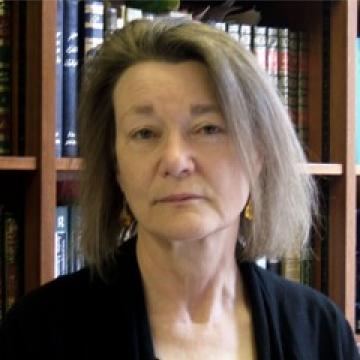Julia Bray
Position:
Retired Professor of Arabic
Faculty / College Address:
Faculty of Asian and Middle Eastern Studies / St John's College
Email:
Research Interests:
- The techniques of medieval Arabic writing and its social and political functions.
- How poetry and narrative create and explore ideas.
- Life writing and story telling.
- Arabic book culture.
- The Arabic history of emotions.
Current Projects:
- An edition and translation of al-Tanūkhī’s al-Faraj ba‘d al-shidda for the Library of Arabic Literature.
Recent Publications:
- “Men, women and slaves in Abbasid society”, Leslie Brubaker and Julia M. H. Smith (eds.), Gender in the Early Medieval World. East and West, 300-900 (Cambridge : Cambridge University Press, 2004), pp.121-46.
- “Practical Mu‘tazilism: The Case of al-Tanūkhī”, ‘Abbasid Studies. Occasional Papers of the School of ‘Abbasid Studies, Cambridge 6-10 July 2002, James E. Montgomery (ed.) (Leuven : Peeters, 2004. Orientalia Lovaniensia Analecta 135), pp.111-26.
- “ ‘Abbasid myth and the human act: Ibn ‘Abd Rabbih and others “, Philip F. Kennedy (ed.), On Fiction and Adab in Medieval Arabic Literature (Leiden : Brill, 2005), pp.1-54.
- (ed.), Writing and Representation in Medieval Islam. Muslim Horizons (London and New York: RoutledgeCurzon, 2006).
- “The physical world and the writer’s eye: al-Tanūkhī and medicine”, Writing and Representation in Medieval Islam, pp.215-49.
- “A Lebanese chapbook of ca.1900: romance, folklore and modernity”, Frédéric Bauden et al. (eds.), Le Répertoire narratif arabe médiéval: transmission et ouverture. Actes du colloque international qui s’est tenu à l’Université de Liège (15-17 septembre 2005) (Geneva: Droz, 2008), pp.121-41.
- “Place and self-image: the Buhlūlids and Tanūhids and their family traditions”, Quaderni di Studi Arabi n.s. 3 (2008) [2010]: Luoghi e immaginario nella letteratura araba, Antonella Ghersetti (ed.), p.39-66.
- “Starting out in new worlds. Under whose empire? High tradition and subaltern tradition in Ottoman Syria, 16th and 19th/20th centuries”, Annali di Ca’ Foscari 48 (2009) [2010], pp.199-220.
- “Dāwud al-Anṭākī (d. ca.1599)”, Essays in Arabic Literary Biography, 1350-1830, Joseph E. Lowry and Devin Stewart (eds.) (Wiesbaden: Harrassowitz, 2009), pp.49-56.
- “Arabic literature”, The New Cambridge History of Islam, vol. 4, Robert Irwin (ed.): Islamic cultures and societies to the end of the eighteenth century (Cambridge: Cambridge University Press, 2010), pp.383-413.
- “Christian king, Muslim apostate: depictions of Jabala in the early Arabic sources”, Arietta Papaconstantinou (ed.), Writing ‘True Stories’. Historians and Hagiographers in Byzantium and the Middle East (Turnhout: Brepols, 2010), pp. 175-203.
- “Literary approaches to medieval and early modern Arabic biography”, Journal of the Royal Asiatic Society, Series 3, 20, 3 (2010), p.1-17.
- “Ibn al-Mu‘tazz and Politics: The Question of the Fuṣūl Qiṣār”, Oriens 38 (2010), pp.107-43.
- “The Family in the Medieval Islamic World”, online @ History Compass 9 (2011), pp.1-12 (Wiley-Blackwell subscriber publication).
- “Jabala”, Encyclopedia of Ancient History, Roger Bagnall, Kai Broderson et al. (eds.) (online publication: Wiley-Blackwell, 2012).
- “The Family in Medieval Islamic Societies”, Approaches to the Byzantine Family, Leslie Brubaker and Shaun Tougher (eds.) (Farnham, etc.: Ashgate: 2013), pp.131-51.
- co-trans. and Introduction, Ibn al-Sāʿī, Consorts of the Caliphs. Women and the Court of Baghdad (New York University Press, 2015. The Library of Arabic Literature).
- “Toward an Abbasid History of Emotions: The Case of Slavery”, International Journal of Middle East Studies 49 (2017), pp.143-7.
- “Yaʿqūb b. al-Rabīʿ Read by al-Mutanabbī and al-Mubarrad: A Contribution to an Abbasid History of Emotions”, Journal of Abbasid Studies 4 (2017), pp.1-34.
Further Information:
I have taught Arabic and Arabic literature at the universities of Manchester, Edinburgh and St Andrews. From 2003 to 2012, I was Professeur de littérature arabe médiévale at the Université Paris 8 Vincennes-Saint Denis and a member of the research team EA 1571 Centre de Recherches Historiques. I am the first woman to hold the post of Laudian Professor (from September 2012) since the chair was founded in 1636.
With Professor Wen-chin Ouyang, School of Oriental and African Studies, University of London, I co-edit the monograph series Edinburgh Studies in Classical Arabic Literature. Its purpose is to open up new vistas on an intellectual and imaginative tradition that has repeatedly contributed to world cultures and has the continued capacity to stimulate new thinking. Edinburgh Studies in Classical Arabic Literature
I am also a member of the Editorial Board of the Library of Arabic Literature (New York University Press; General Editor: Philip F. Kennedy, NYU), a series which edits Arabic works on a wide variety of topics central to the culture, from the earliest literature to the 19th century, and publishes them with facing English translation. www.libraryofarabicliterature.org
Recent events that I have co-organised include a workshop in the series “Arabic Pasts”, co-organised with The Agha Khan University, London; SOAS, London, and Trinity College, Oxford, held on 20th September 2013 at St John’s College Research Centre on the subject of Social and Cultural Memory in the Middle East and North Africa; two further workshops supported by the Research Centre: “Picture-poems and the esoteric in 6th/12th-century Syria”, 23-24 July 2015 and “Semantic Digital Humanities”, 25-27 September 2015.
Podcasts:




